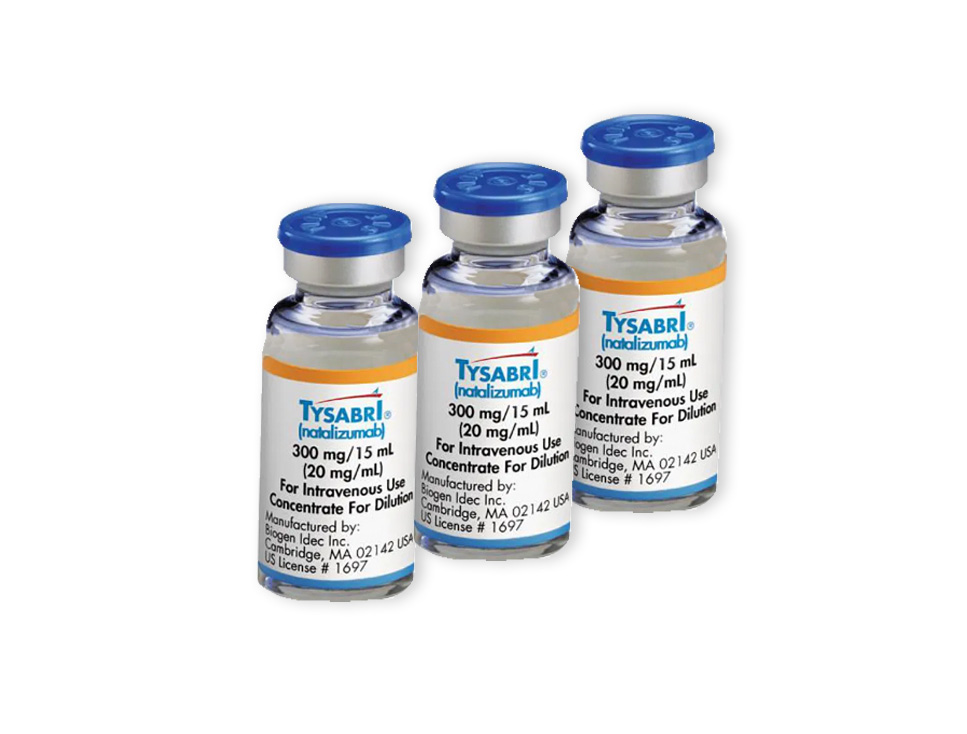Tysabri is manufactured in the United States and shipped by courier by our pharmacy in India.
Information about Tysabri (Natalizumab)
Tysabri (Natalizumab) is a monoclonal antibody that works by targeting and inhibiting specific immune cells involved in the inflammation process that characterizes autoimmune conditions like multiple sclerosis (MS) and Crohn's disease. It helps to reduce inflammation and prevent the immune system from attacking healthy tissues, which is particularly useful in managing MS and certain forms of Crohn's disease.
Product Highlights
- Tysabri is indicated for the treatment of relapsing forms of multiple sclerosis to reduce the frequency of relapses and delay the progression of disability.
- Tysabri is also indicated for moderate to severe Crohn’s disease in patients who have not responded to conventional treatments or immunosuppressive therapies.
Key Ingredient
Key Benefits
- Tysabri helps to reduce the frequency of MS relapses and slows the progression of disability in people with relapsing forms of MS.
- It is effective in reducing symptoms and inducing and maintaining remission in patients with moderate to severe Crohn’s disease.
- By reducing the disease activity in MS and Crohn’s, Tysabri can significantly improve the quality of life for patients by controlling symptoms and preventing further tissue damage.
- As an IV infusion, Tysabri is given once every four weeks, which provides convenience for patients who don’t want to take daily oral medications.
Direction of Use
- Tysabri is administered via intravenous (IV) infusion in a healthcare setting.
- The typical dosage is 300 mg once every four weeks.
- The infusion typically lasts about one hour, and patients are monitored for any allergic reactions or side effects during and after the infusion.
- It is crucial to follow the dosing schedule, and patients should not miss doses to ensure the medication remains effective.
Safety Concerns
- One of the most serious risks associated with Tysabri is PML, a rare but potentially fatal brain infection caused by the John Cunningham virus (JC virus). Regular screening for JC virus antibodies may be required before and during treatment.
- Since Tysabri affects the immune system, it can increase the risk of infections, including opportunistic infections.
- Liver injury, including hepatitis and liver failure, has been reported. Liver function should be monitored during treatment.
- Some patients may experience allergic reactions during or after the infusion, which can range from mild to severe.
- The safety of Tysabri during pregnancy or breastfeeding has not been fully established, so it should only be used if necessary and prescribed by a doctor.
Avoid Tysabri (Natalizumab) If
- Tysabri should be avoided in patients with active infections, especially those that may be caused by opportunistic pathogens, as it can suppress the immune system.
- Due to the risk of progressive multifocal leukoencephalopathy (PML), Tysabri should not be used in patients who have previously had PML.
- If you have liver disease, especially in its active phase, Tysabri should be avoided due to the risk of further liver damage.
- Tysabri should be used with caution during pregnancy and breastfeeding, and only if the potential benefits outweigh the risks. It is advised to discuss this with your doctor before starting treatment.
This product requires special packaging to maintain its integrity during the shipping process. DO NOT USE THIS MEDICATION if the attached temperature indicator shows that the medication was exposed to temperatures below 2 degrees or above 8 degrees Celsius, and contact the pharmacy immediately.





